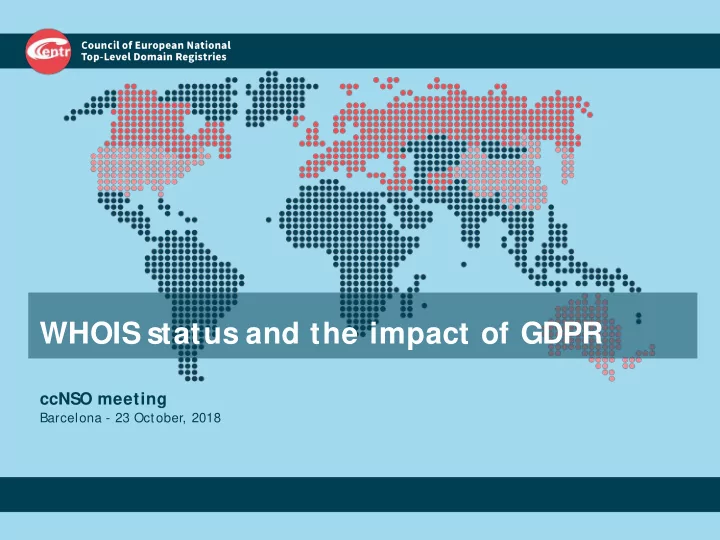

WHOIS status and the impact of GDPR ccNSO meeting Barcelona - 23 October, 2018
Survey Details • Period : June – July 2018 • Initiator : CENTR • Respondents : .at, .au, .be, .ch, .cz, .de, .dk, .ee, .es, .eu, .fi, .fr, .ie, .lu, .me, .nl, .no, .nz, .pl, .pt, .rs, .se, .si, .ua, .uk 2
Covered in this session • What data is publicly available in the WHOIS of European ccTLDs? • What mechanisms are used to help LEA gain access to non-public data? • How is data accuracy verified? • Is there a problem with RARs refusing to transfer data? • How are the rights of the data subj ect safeguarded? • What is the average response time for data disclosure requests? • How do registries differentiate between private individuals and companies? 3
Wha hat da data is publ publicly a availa ilable le in n the he WHOIS IS of E Eur uropean c ccTLDs? Shows average % of EU based ccTLDs that collect/publish WHOIS fields within the group 4
Wha hat da data is publ publicly a availa ilable le in n the he WHOIS IS of E Eur uropean c ccTLDs? Shows average % of EU based ccTLDs that collect/publish WHOIS fields within the group 5
Wha hat da data is publ publicly a availa ilable le in n the he WHOIS IS of E Eur uropean c ccTLDs? Shows average % of EU based ccTLDs that collect/publish WHOIS fields within the group 6
Wha hat da data is publ publicly a availa ilable le in n the he WHOIS IS of E Eur uropean c ccTLDs? Shows average % of EU based ccTLDs that collect/publish WHOIS fields within the group 7
Wha hat da data is publ publicly a availa ilable le in n the he WHOIS IS of E Eur uropean c ccTLDs? Shows average % of EU based ccTLDs that collect/publish WHOIS fields within the group 8
Available at: https://stats.centr.org/pub_whois 9
Holder identify verification • Verification mostly (52% ) after registration (32% do not verify at all, 16% verify during the registration process) • S ources for verification: – business registers – supporting documents – others: ID cards, bank accounts, google maps.. • (Partial) verification of accuracy automated for 40% of registries 10
RAR to registry data transfers • 25% of respondents receive only (partly) obfuscated data from RARs • In those cases it is typically the email address that is obfuscated (50% ) 11
Publishing data in the WHOIS • Although several registries explicitly stated they do not publish personal data in the WHOIS , others list some of the legal grounds they rely on to publish registrant data. The common grounds were; – Legitimate interest or to allow contact from third parties – Contract or terms and conditions – Consent by registrant (for example, opt-in) – National law • Opt-in service – 11 offer. 11 do not offer. 3 are planning to offer 12
Data retention and requests • For 60% of registries, data on the domain holder is kept for more than 5 years following deletion of the domain, and for 32% (or 8 registries) it is kept forever. • The ‘ right to be forgotten’ for many registries is not implemented for registration data. • Generally, requests for access, rectification and deletion are either handled by the customer service, the legal department and/ or a dedicated DPO or privacy team. There is no one department or team that is more use more commonly than another. 13
Access requests 14
Access requests 15
Access requests 16
Access requests 17
Access requests 18
Individuals vs organisations 19
Thank you peter@ centr.org – polina@ centr.org
Recommend
More recommend